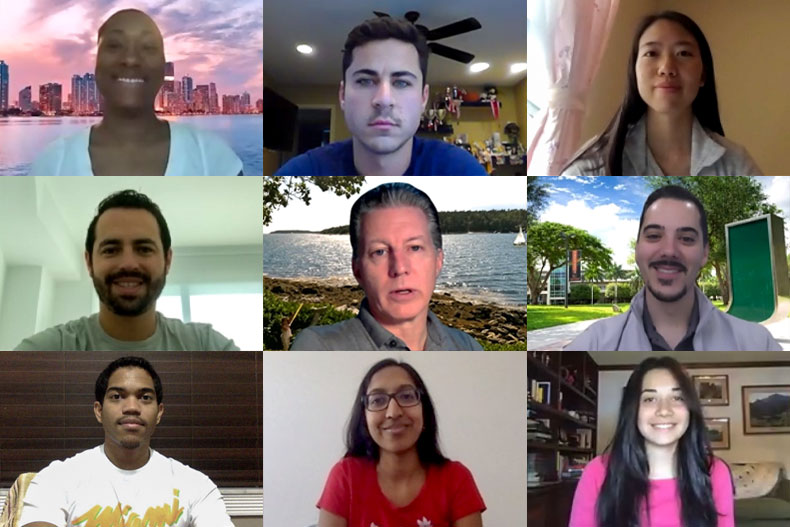One of the budding lawyers—a former national figure skating champion—started her first business, selling candy, on her elementary school bus. One M.B.A. student was a fashion designer in New York. Another taught anatomy and worked for a company that explored regenerative medicine. The two medical students are pursuing their M.B.A.s along with their M.D. degrees.
They are among the nine accomplished University of Miami graduate students who are turning Vice Provost for Innovation Norma Kenyon’s vision for the ’Cane Angel Network into reality. Now open for business, the new enterprise for University-affiliated start-ups connects investors to companies in need of early-stage funding. The students taking this elective have the job of building the network—which is open to all eligible University students, alumni, employees, or their direct relatives—from the ground up.
“This is no academic exercise,” said Jeffrey Camp, the network’s founding managing director and instructor of the inaugural ’Cane Angel Network—Investing in the Real World course. “These students are dealing with real companies and real dollars.’’
And, with the COVID-19 pandemic that forced the University to move all classes online, they’re laying the foundation for the business network amid imploding economies, exploding unemployment, plummeting markets, and paralyzing uncertainties.
This hardly seems like the best environment in which to recruit University-affiliated angel investors who pay a $2,500 annual fee for the opportunity to take part in companies that survive the network’s vetting and due diligence processes, which the students spent the first part of the spring semester implementing under Camp’s guidance.
But Camp, who was a No. 1-ranked Wall Street investment analyst during the 2000 dot.com boom and bust, doesn’t see it that way. He noted that Kenyon, who is also the Miller School of Medicine’s chief innovation officer, substantially strengthened the University’s innovation ecosystem since taking the helm of U Innovation seven years ago. Today, the University boasts more than 80 faculty-founded start-ups and is licensing about 30 faculty inventions a year.
“Uber, Airbnb, Venmo, and Stripe all started during the 2008 Great Recession and all are now ‘unicorns’—a term used for start-ups that achieve a valuation in excess of a billion dollars,” Camp said. “So savvy angels and strong founders can do well in any environment. And, thanks to the infrastructure in place, the network is poised to capitalize on the University’s strength in research, as well as its extensive alumni network, to help find opportunities even during difficult times.”
The students—four M.B.A. candidates, three law students, and two medical students—share that can-do spirit, and aren’t daunted by the challenges. They’ve barely missed a beat since returning from an extra week of spring break to what is now Camp’s virtual Zoom classroom, which operates like a real-world investment firm. There are no lectures or tests, only meetings and brainstorming sessions where Camp and the students share their respective skills and expertise and decide who’s best suited or most interested in completing innumerable tasks.

They continue to write the training manual for their successors and are creating original content for the network’s website and developing the digital, social media, and email marketing strategies that will replace the in-person meetings and events that aren’t feasible in the new work-at-home world. Originally, Camp, who over his 30-plus years of investment experience founded or led several global companies, planned to introduce the network, an initiative of the University's Roadmap to Our New Century, at last month’s scheduled eMerge Americas conference. But like all events, Miami’s premier tech gathering was cancelled.
“So, we had this little wrench thrown in the works,” said first-year M.B.A. student Brian Galea, who holds a master’s degree in anatomy and worked for a biomedical firm but plans to move into the world of venture capital. “We’re all entrepreneur-minded self-starters so we look for other ways to get the job done. How do we keep moving? What’s the goal and how do we get there?”
For now, the priority is attracting angel investors to the network, which is designed to fill the gap between the family and friends who budding entrepreneurs and inventors tap—and eventually tap out—to cover initial costs, and venture capitalists who set their sights on bigger and surer bets.
“Angel investors sit in the middle—between your Uncle Joe, who can’t spare another 10 grand, and venture capitalists, who can’t be bothered with anything smaller than a $2 million or $5 million investment,” Camp explained. “This middle stage is often the most difficult for entrepreneurs and why angel investors can play such as important role. Typically, angel investors have been successful entrepreneurs in their own right, so they don’t just provide capital. They provide expertise and guidance, which combined with capital, can help founders take their company to the next level.”
The opportunity to learn more about business development in general, but about investors in particular, drew first-year M.B.A. student Tamara Johnson to the ’Cane Angel Network elective. A former fashion designer, she hopes to land a supply chain management role that allows her to oversee product development from concept to end-user—which is what she did in the New York garment industry.
“But I didn’t know anything about the investment side, and I’m really curious about investors,” Johnson said. “How do they get involved? How do they determine their return on investment? And, how do you get them not only to invest in but to see the value of your product?”
One of two M.D./M.B.A. dual degree students in the course, Neelima Gaddipati, who majored in neuroscience and minored in health sector management and policy and economics as an undergrad, said Camp and the business students have opened her eyes to new approaches to addressing the structural and organizational management problems that impede the delivery of health care.
“In medicine, you accumulate so much knowledge so you can make evidence-based decisions for each patient, so I found it really interesting that there’s really no handbook on how to succeed as a start-up because they’re all unique,” Gaddipati said. “So, we have to standardize as much as we can, but with flexibility for the unique nature of each enterprise.”
Farah Sheikh, a third-year law student who is familiar with trademark and business association law from her participation in the School of Law’s start-up practicum, said she, too, is learning a lot from her student investment teammates, which she thinks is a huge plus for the network.
“We are such a well-rounded and diverse pool,” said Sheikh, the 2013 U.S. Ladies Collegiate Figure Skating National Champion, who, in addition to the candy business she launched in grade school, recently ran a business coaching fellow skaters. “We’re curious and avid learners who bring our own undergraduate, work, and graduate school experiences to the table, which I think is a positive for future investors who will count on us to vet investment proposals.”
Camp couldn’t agree more. As he noted, these students are operating in an environment very similar to an investment firm in almost every regard but one: “It would be very rare,” he said, “to find a group with the breadth of skills and experiences that the network’s inaugural student investment team has.”

